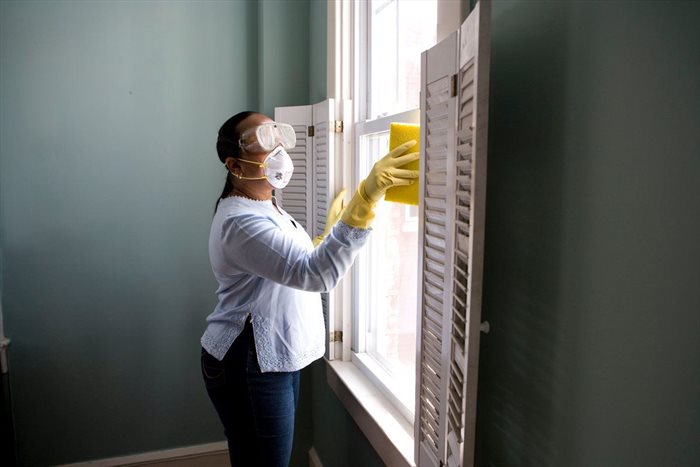As someone who's job is to find stories in data, Covid-19 is starting to feel like War and Peace. Not a day goes past without a stat being flung about that has the potential to melt your brain and make you question everything you thought you knew or hoped was true.
Take, for example, recent breaking news from Takealot who released figures on its top 10 hottest-selling products since restrictions were lifted on 14 May. Special mention was made of 'unexpected items' like non-alcoholic beer, but the one that caught my eye was the #1 best seller in the first week of freedom... vacuum cleaners!
The likes of laptops, PlayStations, home gym equipment and ink cartridges were to be expected - they're either consumables, new-normal necessities or the kind of things that sell big on Black Friday - but what's with the Hoovermania, people?
I've checked out just about every global shopping trend available and ours does seem a random result. After all, most people can go years without using the words 'vacuum' and 'cleaner' in the same sentence.
And then it struck me that perhaps it's the first piece of hard evidence of the most extreme trauma that wealthy households of all creeds and colours have had to endure in these cruel and unusual times: no, not running out of craft gin and Glenmorangie, but rather (cue dramatic music) a lack of domestic staff.
There are, according to Stats SA, at least one million South Africans who rely on employment as domestic workers of whom the majority (like 70% or more) are primary breadwinners in the family. It's an extraordinarily vulnerable sector of our labour market and, sadly, often a first-stop on the road to cost-cutting when times are tough. So let's hope that the majority of employers come out of isolation desperately missing their cleaning, gardening and care staff, and valuing their contribution more than before, not the other way around.
Just before prohibition and house arrest kicked in, I joked with my colleagues about how we'd see a surge in Google search for: 'download instruction manual for {insert make and model number} dishwasher/washing machine'. And oh, how we laughed as stories started doing the rounds of people you'd never expect to have no idea what buttons to push because they'd never had to do it themselves.
Which brings us back to dust inhalation. The last time we checked (BrandMapp 2017) more than 70% of wealthy South Africans owned vacuum cleaners, and most surveys since concur. So why the rush for upgrades after just two months of subsistence-cleaning?
Perhaps people have realised they've been buying cheap, semi-disposable brands with a built-in two-year lifespan and now's the time to 'buy-up'. Or maybe, since Covid-19 inconveniently chose autumn to invade our shores, people are burning out their vacuums by mistakenly using them as leaf blowers. Possible, but unlikely. Stranger forces seem at play. Here's my working theory...
First, let's deal with the 30% of appliance-free people. Presumably, they've never stopped to question how their domestic worker manages to keep things tidy armed only with analogue equipment: mops, brooms, pans, etc. It probably took just the one Sunday sweeping session ("come on kids, if we do it together we'll be finished in no time") for the decision-maker in the household to have a Damascene moment: "OMG, this would be muuuch easier with a vacuum cleaner!" Ignorance was bliss. Problem solved.
The second group, the 70% are more curious, but chances are they are the kind of people for who house-cleaning is some sort of magical backstage act that happens while they're at the office, fetching kids from school, at the gym or having a massage. When they arrive home, someone's waved a wand and everything's neat, tidy and sparkly with a faint whiff of pine and lavender. They are basically guests in their own hotel.
I reckon that when these poor folk were forced to suck it up themselves for the first time, they suddenly realised the tools they've been providing for their maintenance staff were either woefully inadequate, in desperate need of repair or just plain rubbish. And there's no shame in it. The average captain of industry hasn't had a reason until now to ponder the difference between a R1,500 Bosch Easy Vac 3 and a Dyson CY26 Big Ball Animal Pro 2 Bagless Cylinder Vacuum on special at R11,999.
There's nothing malicious at play, it's more likely a text-book case of executive apathy. The cure? Simple: get the boss to give the lounge a quick once-over with a vintage Electrolux, featuring a half-broken hose, wobbly wheels, 200 wheezy watts of 'power' and none of the original nozzles it shipped with at the turn of the millennium.
Here's how that scene ends: Defeated by seemingly immovable dust bunnies behind the sofa, the distraught homeowner falls to their knees like the poster for Platoon and cries out: "What have we done? This is a load of sh*t! How has [insert domestic worker's name here] managed to work with it for all these years?!?" Fueled by a heady mix of embarrassment, guilt and humility, they make a promise to themselves: When Takealot's back online, I'm going to search for 'best + vacuum cleaner' and blow a couple of grand, if that's what it takes.
And with all of us living, ironically, in a vacuum, similar stories must be playing out in a multitude of places in a myriad of ways. From push-mowers, blunt saws and wonky step-ladders to Teflon pans that have lost their coating, we've all been given a wonderful opportunity to consider how our actions impact others, even within the confines of our homes.
At best, we might end up being a slightly more considerate, compassionate and tolerant society - and people of privilege will feel more comfortable laughing, or, at least, smiling at themselves. At worst, there's a bunch of domestic employees who are in for a pleasant surprise when they get back to work!

















































